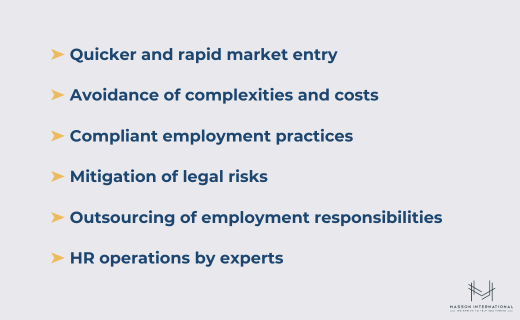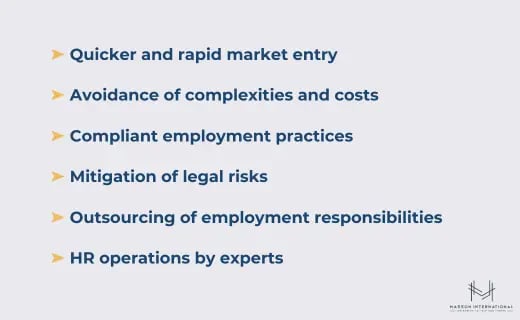Hiring in France presents unique opportunities and challenges, particularly for international companies aiming to expand their footprint. An Employer of Record (EOR) in France simplifies the hiring process by managing HR duties, statutory benefits, tax filing, and compliance with local labor laws. This guide dives into how businesses can leverage EOR services to streamline operations, ensuring a smooth entry and sustainable growth in the French market.
Introduction to Hiring in France with an Employer of Record
Entering the French market requires navigation through complex employment laws, making the hiring process daunting for foreign companies. An Employer of Record in France offers a strategic solution, allowing companies to hire local talent without the need to establish a legal entity.
This approach reduces the costs associated with setting up operations in France and ensures compliance with local employment regulations.
The EOR becomes the legal employer, handling all administrative tasks, from recruitment to payroll, tax filing, and termination. This arrangement frees companies from the burden of HR duties, allowing them to focus on core business activities. Additionally, an EOR provides expert guidance on local labor laws, ensuring compliant employment practices.
Using an EOR service is particularly advantageous for companies aiming for rapid market entry and global expansion. It offers a flexible solution to test the French market without the long-term commitment and costs associated with setting up a subsidiary. Furthermore, it mitigates the risk of non-compliance with local laws, which can have significant financial and reputational consequences.
An EOR in France simplifies the hiring process and acts as a strategic partner in navigating the complexities of French employment laws and regulations.
Understanding the Basics of an Employer of Record in France

An Employer of Record (EOR) in France acts as the legal employer for your staff, taking responsibility for all employment-related obligations. This arrangement allows businesses to hire employees in France without establishing a local entity, which can be time-consuming and costly.
The EOR handles payroll, tax, HR duties, and compliance with employment laws, significantly simplifying the hiring process for foreign companies.
By partnering with an EOR, companies can quickly onboard local talent and ensure that all statutory benefits and worker protections are fully managed. This includes adherence to France's strict labor laws, from contract negotiations to termination procedures.
The EOR's role is crucial. It ensures that clients focus on their operational goals, leaving the complexities of employment regulations and administrative tasks to the experts.
The EOR model is particularly beneficial for companies looking to test the French market or undertake short-term projects. Furthermore, EOR services provide companies with flexibility and scalability, enabling them to adjust their workforce based on business needs without the hassle of navigating administrative tasks.
EOR vs PEO: Clarifying the Differences
While both Employer of Record (EOR) and Professional Employer Organization (PEO) services ease the burdens of HR duties and compliance for businesses, they serve distinct functions.
An EOR legally employs staff on behalf of a company, taking full responsibility for employment tasks, including compliance with local labor laws and managing payroll.
Conversely, a PEO co-employs staff, sharing responsibilities with the company but generally requires the company to have an existing legal entity in the country. Understanding this difference is crucial for companies deciding between setting up a legal entity or using an EOR to operate in France.
The Advantages of Using an Employer of Record in France for Your Business
Employer of Record services can offer numerous benefits to companies looking to expand their business operations in France. By outsourcing employment responsibilities to experts, businesses can focus on core competencies and strategic activities.
Here is the list of advantages of an EOR in France:
- Quicker and rapid market entry
- Avoidance of complexities and costs associated with establishing a local entity
- Agility for businesses looking to quickly test the market or capitalize on short-term opportunities
- Compliant employment practices
- Management of HR operations by experts, providing a strategic advantage in a competitive and regulated market like France
- Mitigation of legal risks and safeguarding against legal challenges
- Outsourcing of employment responsibilities, allowing companies to focus on core competencies and strategic activities

Simplifying HR, IT, and Finance Operations
Utilizing an Employer of Record (EOR) significantly simplifies HR, IT, and finance operations, particularly for companies undergoing global expansion.
By managing all employment-related tasks, an EOR allows businesses to streamline their operations, reducing the administrative burden and freeing up resources to focus on business expansion strategies. This includes onboarding processes and termination processes, IT implementation of payslips for France, and constant banking operations to pay salaries and taxes.
This is particularly valuable for companies without the in-house expertise to navigate these areas in a foreign market or in France.
The Role of an EOR in Protecting Sensitive and Confidential Company Information
An Employer of Record (EOR) in France plays a pivotal role in safeguarding sensitive and confidential company information. They manage the French payroll and ensure that all data handling meets the legal requirements.
France being part of the EU, the French EOR company must respect the GDPR laws, which prevent them from sharing certain employee or client information with third parties.
A Deep Dive into Employment Regulations in France

France's employment regulations are intricate and designed to protect both employers and employees. These laws cover a wide range of areas, including working hours, leave entitlements, and employee rights. For companies looking to operate in France, understanding these regulations is crucial to ensure compliance and avoid legal pitfalls. The French legal framework is known for its employee-centric approach, making it essential for businesses to carefully navigate these laws.
At the core of French employment law is the principle of protecting worker rights while providing employers with the framework to manage their workforce effectively. This balance is critical in maintaining a harmonious workplace environment and avoiding disputes that could lead to legal complications. Employers must be diligent in adhering to these regulations to foster a positive and productive working relationship with their French employees.
Employment Contracts: Key Considerations and Requirements
An employment contract in France is an essential document that outlines the terms of employment between an employer and an employee. The contract must clearly state the job description, salary, working hours, and other essential terms. This transparency helps set clear expectations and avoid future misunderstandings. French law requires that employment contracts be drafted with precision, taking into account the specific requirements set forth by the labor laws.
The specificity of an employment contract in France serves to protect both parties involved. For employees, it provides a clear understanding of their rights and obligations, while for employers, it outlines their expectations and the conditions under which they can terminate the contract. Ensuring that these details are accurately captured in the contract is crucial for a smooth employment relationship.
Moreover, the contract acts as a legal safeguard, providing a reference point in case of disputes. Employers must ensure that the contract complies with French labor laws, including minimum wage requirements, working hours, and leave entitlements. Failure to adhere to these legal requirements can result in significant penalties and damage to the employer's reputation. It is advisable for companies to seek guidance from experts or consider partnering with an Employer of Record (EOR) to navigate these laws effectively.
Probationary Periods and Their Significance
The French Labor Code allows for probationary periods (trial period), offering both employers and employees a timeframe to assess suitability for the role. This period in France is crucial as it sets the tone for the employment relationship. For employers, it provides an opportunity to evaluate the employee's performance and fit within the company. Similarly, employees can determine if the job meets their expectations and career goals.
It is important to note that the length of the probationary period in France varies depending on the position and contract type. Employers must clearly specify the duration of the probationary period in the employment contract. Adhering to the rules governing probationary periods is essential to ensure compliance with the French Labor Code and to avoid potential legal challenges.
Understanding Termination Laws and Severance Pay
Termination laws in France are designed to protect employees while providing a clear framework for employers to follow when ending an employment relationship. These laws cover various termination scenarios, including dismissal for cause, redundancy, and mutual agreement. Employers must provide a valid reason for termination and follow the procedural requirements of the French Labor Code, including notice periods and severance pay.
Severance pay in France is calculated based on the length of service, with specific formulas determining the minimum entitlement. Employers must comply with these requirements to avoid legal disputes and penalties. The focus on length of service emphasizes the value of the employee's contribution to the company and aims to provide financial support during their transition.
Understanding and complying with termination laws and severance pay requirements are essential for employers operating in France. These laws are complex and require careful consideration during the termination process. Employers should seek legal advice or partner with an EOR to ensure compliance and manage termination procedures smoothly.
The intricacies of termination laws in France highlight the importance of maintaining clear and transparent communication with employees throughout their tenure. By adhering to these regulations, employers can foster a positive workplace environment and minimize the risk of disputes. This approach benefits the employees and supports the company's reputation as a fair and responsible employer.
The Comprehensive Guide to Payroll and Taxes in France
Managing payroll and taxes in France can be complex. Employers in France must navigate the monthly payroll process, ensuring that all employer and employee contributions are accurately calculated and reported. The French payroll system involves various deductions, including social security contributions and income tax, which must be handled meticulously.
Employers must also stay abreast of the latest changes in payroll regulations to maintain a compliant payroll system. This includes understanding the nuances of payroll in France, such as the specific deadlines for filing and paying taxes and social security contributions. Employers can avoid penalties and ensure a smooth payroll process for their French employees by using an Employer of Record in France.
Employer and Employee Taxation: What You Need to Know
A thorough understanding of employer and employee taxation is essential to uphold compliant employment practices in France. The French tax system requires employers to withhold income tax from employees' salaries as part of the monthly payroll process. Additionally, employers and employees are responsible for contributing to social security, which covers health, retirement, and other benefits.
The burden of compliance rests with the employer, who must ensure that all contributions are accurately calculated and remitted to the French government. This includes income tax, social security contributions, and other levies, such as the transportation tax. Failure to comply with these tax obligations can result in penalties.
Employers must also be aware of the specific tax benefits and exemptions that may apply to their employees, such as deductions for certain expenses. By staying informed about the latest tax regulations and leveraging expert advice, Employer of Records makes it easier for you to hire in France and manage employees there.
In conclusion, navigating employer and employee taxation in France demands a meticulous approach to many obligations that require careful handling. Employers must ensure compliance with the tax laws to maintain a lawful and efficient payroll system. Partnering with tax experts or an Employer of Record can provide valuable support in navigating these challenges and ensuring all tax obligations are met.
Hiring Employees in France: A Step-by-Step Process

Hiring employees in France involves several critical steps, from understanding the legal requirements to ensuring compliance with tax and social security contributions. Employers must navigate probationary periods, calculate gross salary accurately, and adhere to regulations set by the French government.
Additionally, differentiating between employees and independent contractors is essential to avoid misclassification. Employers and employees must work closely to ensure a smooth hiring process that complies with French employment laws.
Selecting the Right Candidate: Tips and Best Practices
Choosing the right candidate among French employees involves understanding both their professional qualifications and their cultural fit within the company.
It is important to consider a candidate's work experience, educational background, and language skills. Employers should also assess how a candidate's values align with the company culture.
Effective communication, adaptability, and teamwork are crucial traits to look for. By focusing on these areas, employers can make informed decisions that contribute to a harmonious and productive workplace.
Cultural Nuances of Doing Business in France
Understanding the cultural nuances is vital when doing business in France, especially for human resource professionals. French business culture values formal etiquette, clear communication, and a good work-life balance.
Human resource departments must recognize these cultural aspects in their interactions and policies. This includes respecting hierarchical structures within the company and emphasizing the importance of long lunch breaks as part of the French work culture. Adapting to these nuances can significantly enhance the effectiveness of business operations in France.
Onboarding Employees Smoothly with an Employer of Record
Onboarding full-time employees in France can be streamlined with the assistance of an Employer of Record (EOR). An EOR helps new hires integrate into their roles by ensuring all legal and regulatory requirements are met. This includes preparing employment contracts that comply with French law and setting up payroll accounts.
Employee management is another critical aspect in which an EOR provides support. They assist in creating a welcoming and informative orientation process, which is crucial for building a solid foundation for new employees. This includes introducing them to the company culture, team, and responsibilities.
Furthermore, an EOR facilitates the smooth transition of employees into their new roles by offering continuous support. This could involve answering the new employee's questions related to employment laws, benefits, and payroll. By leveraging the expertise of an EOR, companies can ensure a seamless onboarding process for their employees, fostering a positive work environment from the start.
Running an Efficient and Compliant Payroll System
Ensuring an efficient and compliant payroll system is crucial for both the employer and employee in France. An accurate payroll system helps maintain trust and transparency between the two parties. It involves timely and correct salary payments, tax deductions, and social security contributions.
For employers, staying compliant with French payroll regulations is essential to avoid penalties and legal issues. This includes adhering to the country's tax codes, labor laws, and reporting requirements. Employers must ensure that all employee data is accurately recorded and that payroll calculations are performed meticulously.
For employees, a compliant payroll system means receiving their salaries on time and protecting their rights. It also provides clarity on their net pay after deductions. Employers and EORs achieve this level of efficiency and compliance by using payroll software tailored to French regulations or working with a payroll service provider knowledgeable in local laws.
Addressing Common Challenges and Solutions in Hiring French Employees
Hiring French employees comes with unique challenges. To us, the main difficulties foreign companies will encounter in hiring in France are:
- Complex labor laws and the French labor code
- Cultural differences
- Strict regulations, for example, on working hours, employee termination, and benefits
- The language barrier, which can affect communication and integration into the company culture
- Adapting to the cultural nuances of doing business in France, such as respecting the importance of work-life balance or formalities in business communication

To overcome these challenges, employers can seek the support of an Employer of Record (EOR).
Employee Benefits and Entitlements in France

In France, employees are entitled to various benefits that employers must provide. These include mandatory health insurance, pension contributions, and unemployment insurance. Most of these benefits are paid through the employer's taxes. These statutory benefits ensure that employees have financial security in case of job loss and support during retirement.
French employees also enjoy generous vacation entitlements and public holidays in France, such as Easter Monday. This highlights the emphasis on work-life balance in the French work culture. Employers must adhere to these regulations to ensure compliance and maintain employee satisfaction.
Moreover, when hiring employees in France, employers must understand the importance of these benefits in attracting and retaining talent. Offering competitive benefits, in addition to the mandatory ones, can set a company apart in the job market. This includes additional health insurance, flexible working hours, and professional development opportunities.
Mandatory Benefits for French Employees
One essential aspect of hiring employees in France is providing mandatory benefits. Unemployment insurance offers a safety net for employees in the event of job loss, ensuring they have financial support during transitional periods.
Additionally, public holidays in France, including Easter Monday, are recognized days off for employees, contributing to the country's focus on work-life balance. Employers must be mindful of these statutory benefits to ensure compliance with French employment laws.
Understanding and implementing these mandatory benefits correctly is crucial for companies hiring employees in France.
Annual, Parental, and Maternity Leave
In France, employees are entitled to significant leave benefits designed to support work-life balance. Among these, employees are entitled to 5 weeks of paid vacation annually, which helps ensure they have ample time to rest and rejuvenate. This entitlement is a fundamental part of France's labor laws, aiming to promote the well-being of workers across sectors.
Parental leave policies further underscore France's commitment to family life. Parents are provided with the opportunity to take time off work to care for their newborn or newly adopted children. This period allows families to bond without the immediate pressure of returning to work, reflecting the country's values around family welfare and child upbringing.
Maternity leave in France is particularly noteworthy, with mothers typically entitled to a substantial leave period at full pay. It's a mandatory 16 weeks of maternity leave for single births, extending further in the case of multiple births. This policy not only supports the health and recovery of the mother but also ensures the child's well-being in the crucial early months. These leave policies collectively contribute to a supportive work environment, underlining France's dedication to balancing professional and personal life.
Understanding Bonus Payments and Overtime Regulations in France
France's labor laws are structured to ensure fair compensation for employees, which includes regulations around bonus payments and overtime. Bonus payments can vary widely across different sectors and positions, often depending on company performance, individual achievements, or agreed-upon targets. These bonuses are ways to incentivize and reward employees beyond their base salary.
Overtime work is also meticulously regulated in France. Employees working beyond the standard legal working hours are entitled to additional compensation. This regulation ensures that employees are fairly compensated for their extra time and effort, reflecting the country's approach to worker rights and compensation fairness. Paid vacation, as part of the compensation package, further enhances the overall remuneration of employees, making France an attractive place to work.
Health Insurance and Pension Fund Contributions
In France, the welfare of employees is further supported through mandatory health insurance and pension fund contributions. These security contributions are integral to France's social security system, ensuring employees can access healthcare services and financial security in retirement. Employers and employees share the responsibility for these contributions, which are deducted from the gross salary.
These contributions reflect France's comprehensive approach to employee welfare, covering immediate health needs and long-term financial stability. By mandating these contributions, France ensures that all employees, regardless of their employment status or position, have access to essential services, highlighting the country's commitment to universal welfare and social protection.
Navigating Visas and Work Permits for Foreign Employees
The process of global and business expansion often involves navigating the complex landscape of worker protection and regulatory compliance. France's system for managing work permits and visas is designed to support businesses, providing a structured pathway for bringing in international talent. This system plays a crucial role in facilitating the global movement of workers, essential for companies looking to tap into international markets and talent pools.
Types of Work Permits and Visas in France: A Breakdown for Employers
France offers various visa options to cater to different employment scenarios, each designed to accommodate diverse needs. Understanding each visa type's specific requirements and conditions is crucial for employers planning to hire internationally. This knowledge helps in ensuring compliance with French immigration laws and smoothens the process of onboarding foreign talent.
For instance, short-term visas and some work permits for non-residents are suitable for employees engaged in temporary assignments or specific projects. On the other hand, long-term visas and residence permits are necessary for those planning to work in France for extended periods. Each category has its own application procedures and documentation requirements tailored to the nature of the employment and the duration of stay in France.
Navigating these visa types and understanding their nuances is vital to successful international hiring for employers. It ensures that the process is managed efficiently, from approval application to facilitating a smoother integration of foreign employees into the French workforce. Employers must stay informed about the latest visa policy and procedure updates, as these can directly impact the feasibility and timeline of hiring foreign talent.
The Future of Employment in France: Trends and Predictions
The future of employment in France is poised for transformation, influenced by evolving labor laws, tax regulations, and trends that reshape the workplace. A changing landscape that values flexibility, security, and inclusivity.
The Growing Popularity of Remote Work and Its Implications
The shift towards remote work has become increasingly prominent in France, reshaping traditional work environments and expectations. This trend not only offers employees greater flexibility but also challenges businesses to rethink their operational and management strategies.
Adapting to remote work demands innovative collaboration, communication, and work-life balance approaches, highlighting the need for policies and technologies that support remote work models. If you choose to contract with one, you'll need to discuss remote work with your future EOR in France, as compensation may have to be given to employees working from home.
As remote work continues to gain traction, its implications on workplace culture, employee engagement, and productivity are significant. Businesses must navigate these changes thoughtfully, leveraging technology to maintain connectivity and fostering a culture that supports remote work. This adaptation is crucial for companies attracting and retaining top talent in a competitive global market.
How Technology is Shaping the Future of Hiring in France
Technology is pivotal in transforming the hiring landscape in France. From streamlining the application and selection processes to enabling remote interviews, technology is making it easier for employers and employees to connect.
Innovations in digital platforms and tools are also enhancing the efficiency of probationary periods, allowing for more effective evaluation and integration of new hires. This digital shift is not only improving the efficiency of hiring practices but also broadening the scope for employers and independent contractors to engage in more dynamic and flexible work arrangements.
Conclusion: Streamlining Your Hiring Process in France with an EOR
Utilizing an Employer of Record (EOR) service in France offers a strategic advantage for businesses aiming to streamline their hiring process, especially when managing employees in a foreign country. By handling critical aspects of payroll, compliance, and administration, an EOR allows businesses to focus on their core activities and business expansion without being bogged down by the intricacies of employment regulations. This service is particularly beneficial for companies engaging in global employment seeking to navigate the complexities of international payroll and labor laws effectively.
Why an Employer of Record in France is the Solution for Your Hiring Needs
In conclusion, whether it's managing employees, ensuring compliance with local tax laws, or facilitating the smooth onboarding of international employees, an EOR is a valuable partner. This strategic partnership enables companies to optimize their operations and focus on growth, making an EOR an indispensable tool for global business activities in France.
This EOR solution simplifies the complexity of the French legal framework, ensuring compliance with local employment laws, including the strict regulations governed by the Code du travail. It handles the intricacies of French Social Security registrations and contributions, offloading significant administrative burdens for foreign companies that wants to operate in France.
Moreover, an EOR service in France facilitates global payroll management. It ensures that employee benefits in France are adequately met and ensures that every employee’s gross salary is processed correctly, taking into account the specific deductions and contributions required by French law.
This comprehensive support makes the France EOR an indispensable partner for businesses looking to hire highly skilled talent while adhering to local employment standards.
Taking the Next Steps: How to Choose the Best EOR for Your Business
When selecting the best EOR for your company, start by evaluating their expertise.
An ideal EOR should have a deep understanding of the French labor market, including the standard 35-hour-per-week work schedule and specific holiday entitlements- They should offer comprehensive services that cover every aspect of the employee’s contract, ensuring that your business complies with all local regulations and norms.
To learn more about choosing the best EOR in France, we recommend our article 5 Crucial Points to Choose your Employer of Record in France. You can also contact us to ask for a quotation for an EOR in France.
FAQs: Employer of Record France
Employing an Employer of Record (EOR) service in France can significantly streamline the complexities of global employment and payroll management. These services are typically inexpensive compared to the invaluable value for businesses looking to navigate the intricacies of international payroll and labor laws efficiently.
How Much Does an EOR Service in France Cost?
The cost of an Employer of Record service in France generally varies, depending on the scope of services and the number of employees the EOR hires on your behalf. It can be a percentage of the monthly gross salary or a fixed monthly fee. The percentage usually ranges from 5 to 18%. The minimum monthly charge we saw among a few EORs was 700 EUR per employee per month. This amount does not include the employer's taxes and other operating fees they must charge you.
Does an Employer of Record in France Help with French Tax Filings?
An Employer of Record in France simplifies the complexities of hiring in France, including assistance with French employer's tax filings. These services ensure compliance with local tax laws and regulations, relieving employers of the administrative burden associated with tax filings. This support allows businesses to focus on their core operations while ensuring their employment practices fully comply with French law.
Can an Employer of Record Assist in Hiring Internationally?
Yes, an Employer of Record can significantly assist businesses in hiring internationally. This service provides a comprehensive solution covering various employment aspects, from payroll management to compliance with local labor laws. This service is precious for companies looking to expand their workforce globally without establishing a legal entity in France, offering a streamlined approach to international hiring.




